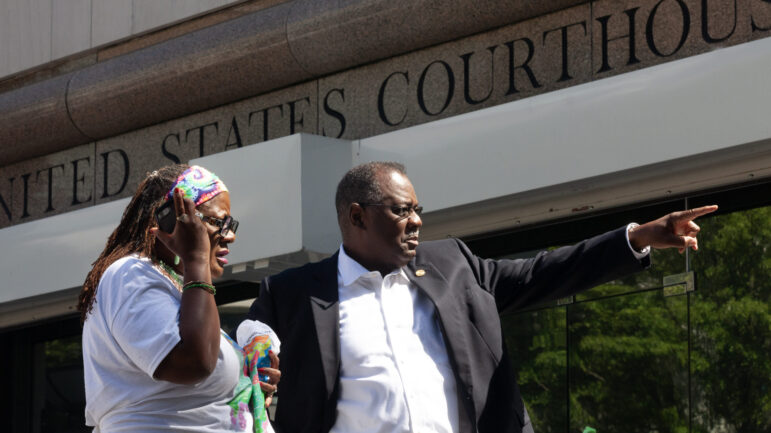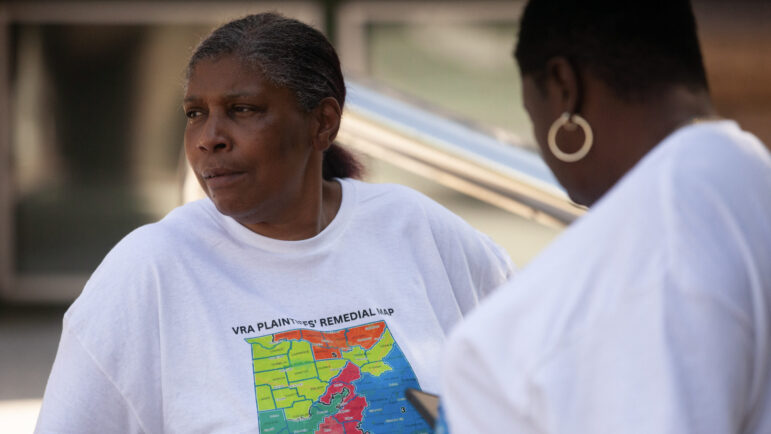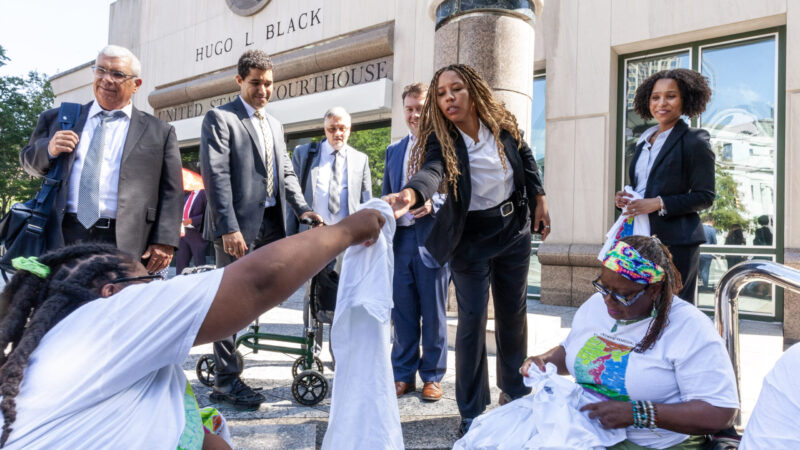Alabama argues its new standards — not SCOTUS order — should dictate congressional map redraw
Plaintiffs in a high-profile redistricting case hand t-shirts to a group of their lawyers after a hearing on Monday, August 14, 2023, in Birmingham, Alabama.
Alabama’s justification for ignoring the U.S. Supreme Court’s directive to create two districts where Black voters have an opportunity to elect their preferred candidate? A new map and new rules mean the court’s order no longer matters.
Attorneys representing Alabama defended the state before a three-judge panel Monday at the Hugo L. Black United States Courthouse in Birmingham. That same panel ruled in 2021 that Alabama’s congressional map violated the Voting Rights Act by diluting the voting power of Black voters.
The federal judges ordered Alabama to draw up a new map, creating two districts that are majority Black or “something quite close to it.” That was delayed until the Supreme Court could weigh in, which it did last June — upholding the lower court’s ruling.
But when Alabama lawmakers passed a new map, it did not have the two ordered majority-Black districts. In one, just over 50% of the voting-age population is Black. In another district, the percentage is 39.9%.
Lawmakers created the map with a new law and passed new standards for drawing a congressional map. Alabama Solicitor General Edmund LaCour argued Monday that the 2023 map should not be judged by the court order, but instead by the new standards — compact districts, splitting as few counties as possible and, the one the state leaned on to defend the new map, keeping “communities of interest” together.
The 2023 map does not split up the city of Montgomery like the old one did, the Black Belt isn’t carved up to the same degree, and Alabama’s coastal communities also stay together — unlike in alternative maps previously presented by the plaintiffs’ teams.
The judges, however, did not appear favorable to the state’s arguments. They repeatedly questioned what weight, if any, the legislature put on the court’s order.
“What I hear you saying is that the state of Alabama deliberately ignored our instruction to draw two majority-Black districts or one where a minority candidate could be chosen,” Judge Terry Moorer said.
LaCour said considering race as the main factor for redrawing a map would be illegal.
“It is not mere race consciousness. It’s race predominance. And that’s unlawful,” LaCour said. “This is as close as you can get without violating the Constitution.”

The plaintiffs’ attorneys said that race can be considered to remedy a violation of the Voting Rights Act. The judgment for this new map shouldn’t be the state’s standards but projected election results. The election outcomes for the proposed map would be no different than the old maps, with Black voters still not having an opportunity to elect a second congressional candidate.
They also said the state doesn’t get brownie points for keeping the Black Belt together if those communities’ interests are not actually represented.
“Alabama should not be rewarded for its bad faith,” Deuel Ross, deputy director of litigation at the Legal Defense Fund, said during opening arguments for the plaintiffs.
In 2021, the plaintiffs’ attorneys argued that Alabama’s Black population is compact enough that it’s possible to make two majority Black districts, and that the state’s politics are so polarized along racial lines that creating those districts is the only way for Black Alabamians to be represented. The judges, and eventually the Supreme Court, agreed and the attorneys reiterated those points in the new hearing.
If the judges rule that Alabama again violated the Voting Rights Act, they could appoint a special master to draw a new map.

The decision in this case could impact other Gulf States as well.
Louisiana also has just one majority-Black district despite up to one-third of its population being Black. Its map has also faced a legal challenge in Robinson v. Ardoin. The Supreme Court had put a hold on that redistricting case pending its decision in the Alabama case. Now, the court has sent Louisiana’s case back to an appeals court.
In Mississippi, lawsuits alleging that Black voting strength is diluted in the state’s legislative and judicial districts could be rekindled, alongside other current challenges to the constitutionality of the state House and Senate districts for similar reasons.
The déjà vu of it all in Alabama — another congressional map accused of diluting Black voting power being heard in front of the same three judges again — did not diminish the optimism from activists on the steps of the federal courthouse after the hearing. Several wore white shirts with a potential map that would satisfy that dream. One man made the 24-hour drive from Arizona to these steps.
Ross, one of the attorneys representing the plaintiffs, said he’s seen this again and again when dealing with civil rights litigation. A federal court strikes down a discriminatory state law and the state comes back with a revised version that doesn’t remedy the original concern.
“Our hope and our expectation is that the courts will not allow Alabama to engage in this gamesmanship and that we’ll continue to see the progress that my clients deserve,” Ross said.
This story was produced by the Gulf States Newsroom, a collaboration between Mississippi Public Broadcasting, WBHM in Alabama, WWNO and WRKF in Louisiana and NPR.
New York Giants hire John Harbaugh as coach after identifying him as their top choice
Harbaugh joins the Giants 11 days after he was fired by the Baltimore Ravens. The Super Bowl champion is now tasked with turning around a beleaguered franchise.
US launches new retaliatory strike in Syria, killing leader tied to deadly Islamic State ambush
A third round of retaliatory strikes by the U.S. in Syria has resulted in the death of an Al-Qaeda-affiliated leader, said U.S. Central Command.
NASA rolls out Artemis II craft ahead of crewed lunar orbit
Mission Artemis plans to send Americans to the moon for the first time since the Nixon administration.
Trump says 8 EU countries to be charged 10% tariff for opposing US control of Greenland
In a post on social media, Trump said a 10% tariff will take effect on Feb. 1, and will climb to 25% on June 1 if a deal is not in place for the United States to purchase Greenland.
‘Not for sale’: massive protest in Copenhagen against Trump’s desire to acquire Greenland
Thousands of people rallied in Copenhagen to push back on President Trump's rhetoric that the U.S. should acquire Greenland.
Uganda’s longtime leader declared winner in disputed vote
Museveni claims victory in Uganda's contested election as opposition leader Bobi Wine goes into hiding amid chaos, violence and accusations of fraud.






